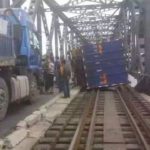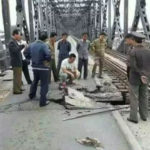Photos from Daily NK
UPDATE 3 (2015-10-26): NK News reports that the bridge was also closed to road traffic in the last week of October for additional repairs.
UPDATE 2 (2015-10-6): Sino-NK Friendship Bridge to open with new regulations. According to the Daily NK:
The Sino-Korea Friendship Bridge has reopened after receiving maintenance for wear and tear that caused a truck accident and an ensuing shutdown of the bridge late last month, Daily NK has learned.
“The transport of cargo was halted because of the truck accident, which was the first to occur in seven decades since the bridge was built, but they’ve resumed transport starting today,” a source in North Pyongan Province told Daily NK on Monday. “They completed three days of work on the bridge, and all cargo trucks are traveling through, but they’ve limited the weight of the truck and cargo to 15 tons to prevent recurrences.”
This news was corroborated via a second source in the same province.
Following a request from the customs office in China’s Dandong, the two sides agreed to abolish the system of allowing cargo to pass according to respective decisions that had created room for passage of overloaded trucks. Instead, authorities will cap the weight of the vehicle and cargo combined at a total of 15 tons.
There are no exceptions at this time, he said; if a vehicle fails to comply with the limit regulations, no access will be permitted.
“Until now, 20 to 30 tons had commonly been the minimum loaded, and often cargo would be much heavier,” the source explained. “Especially more recently, the loads sometimes reached up to 40 to 50 tons due to overloading because of mineral exports that were done in 30-ton containers.”
The bridge is acutely susceptible to damage, he added, noting that North Korea has been overloading trucks with coal, and minerals such as gold, copper, silver, magnetite, molybdenum, and other minerals to earn in foreign currency and secure ‘loyalty funds’ for the leadership since the 1990s.
Mineral exports have reportedly seen a dramatic surge this year, explained by state efforts to reap in capital for Party Foundation Day preparations. However, no attending measures were implemented to control the pervasive practice of overburdening vehicles.
“We (the North) will face a sense of urgency to push out as many minerals as we can to get our hands on more money and import goods, but now with the restrictions on cargo volume now, traders will be swamped,” the source predicted, adding that the number of trucks on the road is also likely to jump significantly.
A flagrant disregard for concern over safety measures is entirely to blame for the accident, he lamented, noting that traders focus all their energies and concerns on raking in ‘loyalty funds’ above all else. While the need for weight regulations was irrefutable, the source surmised that the sudden modification will soon prove to be a double-edged sword.
Going forward, accidents will, presumably, decrease, but disgruntlement from traders faced with bringing in massive loads of supplies into the country leading up to the October 10 celebration is certain to peak, he concluded.
UPDATE 1 (2015-10-1): According to the Daily NK:
The Sino-Korean Friendship Bridge, connecting China’s Dandong and North Korea’s Sinuiju, has been shut down after damage sustained over a protracted period of time caused a truck to flip over. However, with only a number of days left until the Korean Workers’ Party foundation celebration, traffic was temporarily resumed on September 30th, Daily NK has learned.
“Today (September 30th) they resumed traffic just for one day so that North Korean traders can bring in supplies for the event after a truck crashed because of the damage on Monday,” a source from North Pyongan Province told Daily NK.
An additional source in the same province corroborated this news.
Officials have banned entry from October 1 to 4 so that they can restore the bridge, but facing urgent preparation for the Party’s 70th Foundation Day festivities, they put down steel plates as a temporary fix to get truck loads of supplies through, the source explained.
“The accident has thrown customs offices on either side of the border into mad panic,” she added. “Cadres from both customs services surveyed the site of the accident and put things into motion, so construction work is now underway.”
Starting at 8 p.m. on the day of the accident, train services were up and running, but the battered roads with deep crevices were covered with makeshift steel plates by North Korean workers, allowing vehicles that had entered Sinuiju to return to Dandong. Reconstruction work is currently being carried out by Chinese workers, according to the source.
The source speculated that the project would be finalized by October 5, opening up the bridge for a massive trade of goods, leading up to the Party celebration, which falls on the 10th.
ORIGINAL POST (2015-9-29): According to UPI:
A 72-year-old railroad bridge connecting North Korea and China was closed after a crash involving multiple trucks occurred on the North Korea side of the span on Monday.
The Yalu River Bridge, also known as the Sino-Korean Friendship Bridge, was blocked after three or four Chinese trucks rolled at a portion of the bridge that had sunk between 13 and 22 feet, South Korean news network YTN reported.
The bridge has a lane for road vehicles and another for a pair of railway tracks. Trains traveling from China into North Korea were temporarily suspended, but service was resumed after the tracks were repaired, an unidentified source told YTN on Monday.
Another source told South Korean outlet CBS No Cut News the heavy trucks headed for Sinuiju overturned, fell and collided into the adjacent railway tracks, and the accident occurred between 10 and 11 a.m. Vehicular traffic was closed for the rest of the day, and more than 100 trucks from China waiting to enter North Korea were halted, the source said.
The number of casualties was not disclosed.
The bridge, completed in 1943, accounts for 70 percent of commercial traffic between China and North Korea, and the railroad runs from Sinuiju to Beijing.
China remains North Korea’s No. 1 trading partner, and North Korea imports more than it exports to Asia’s largest economy. Pyongyang’s trade dependence on China runs as high as 90.1 percent, according to South Korean government statistics [which exclude South Korean trade with the DPRK].
Read the full story here:
Truck accident on sinking North Korea bridge suspends traffic
UPI
2015-9-29


